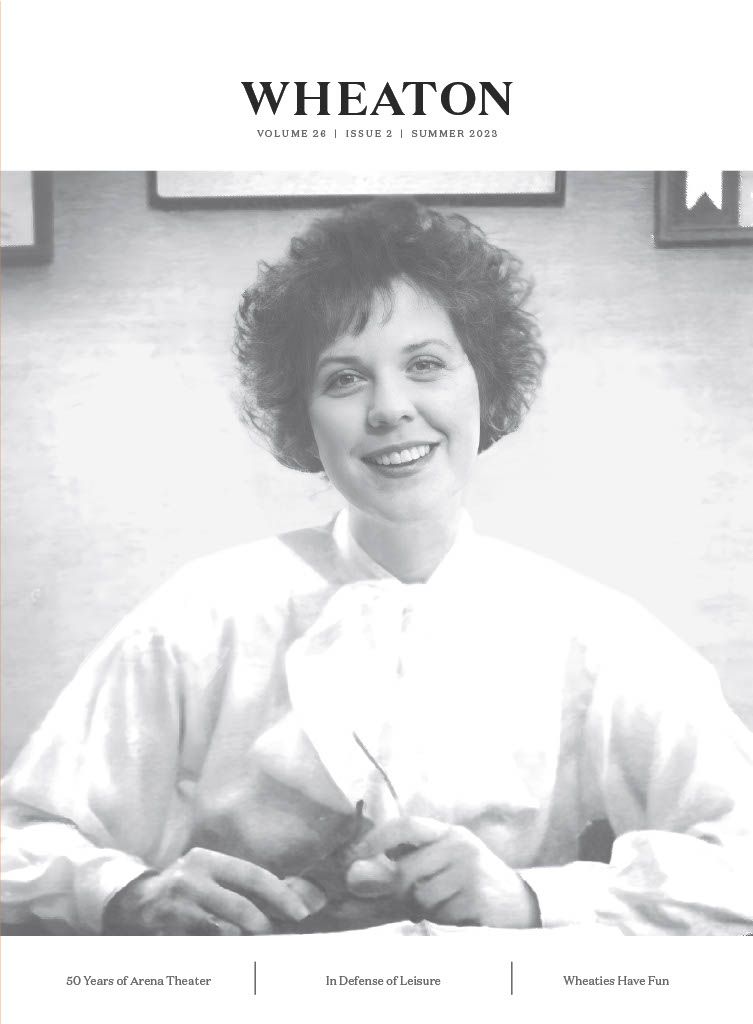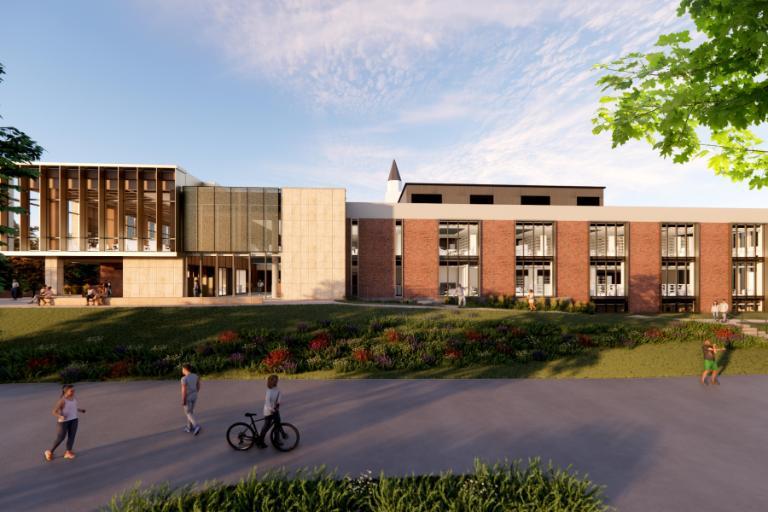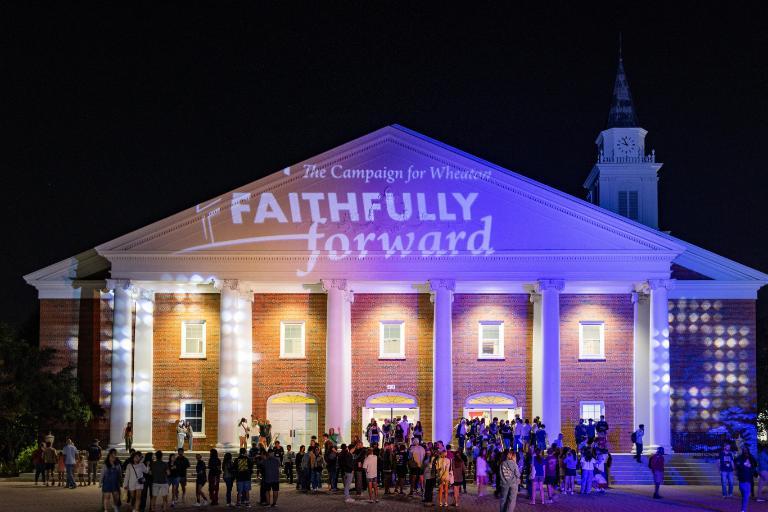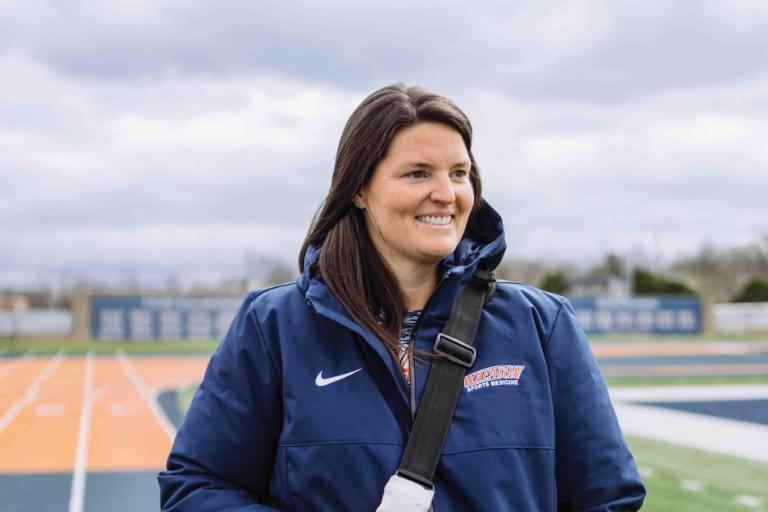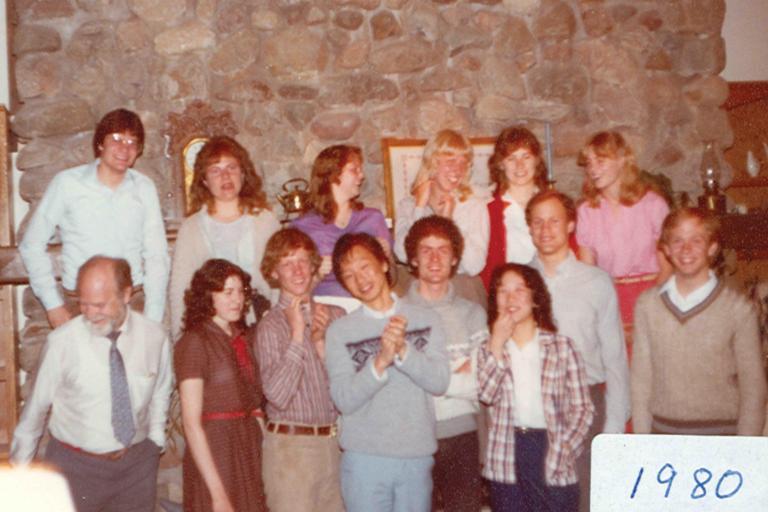A Time for Every Matter Under Heaven
In Defense of Leisure, Play, Fun, and Amusement
Words: Jen Pollock Michel ’96 with reporting by Peter Biles ’20
Photos: Sheldon Till-Campbell ’15

“Hold Your Breath” art exhibition by Professor Joonhee Park.
I was a freshman at Wheaton when I read my first time management book. Although the book purported to be a basic introduction to the spiritual disciplines, the larger, looming context was time. Its scarcity. Its preciousness. One thing was clear: Time shouldn’t be wasted or misspent, certainly not “dawdled” away by mindless television watching. (This was 1992.)
In his letter to the Ephesians, Paul enjoins Christians to exercise wisdom for “making the best use of the time, because the days are evil” (ESV). Throughout the Bible, we’re reminded that human life is as brief and beautiful as a blade of grass—and time, like all of creation’s gifts of God, should be received with gratitude and returned in worship.
The injunction to “redeem the time” (Ephesians 5:16, KJV) might seem straightforward enough, but in our zeptosecond age of atomic clocks and Apple watches, we surely understand this command differently than the letter’s original recipients. The assumption that time can be “managed” requires a relationship to timekeeping that is more historically recent. In fact, Jeremy Taylor’s 16th-century The Rules and Exercises of Holy Living, which begins with a meditation on time, the “first general instrument of holy living,” might be best understood as advice growing up alongside the pocket watch.
“We must remember,” Taylor writes, “that we have a great work to do.” According to the Anglican clergyman, time must be carefully stewarded for fulfilling a range of obligations: to children, friends, the poor, the sick, “our private and our public cares, and duties of the world.” Such time-seriousness raises the question: if the resource is as precious and scarce as we’re taught to believe, and if there remains a “great work” to be done for Christ and his kingdom, what sound defense can be made of time free from obligation and occupation? Of leisure, play, fun, and amusement?
Are we derelict in our Christian duties if we ever make time to “dawdle”?
WHAT’S SERIOUS ABOUT PLAY?
Associate Professor of Art and Communication Joonhee Park held suspicions about play before his wildly successful exhibition, “Hold Your Breath,” late last year, which consisted of over 2,000 balloons blown up by members of the Wheaton College community.
Park was raised in Korea and educated in what he calls their “utilitarian” model. When he became a documentary filmmaker, he was “obsessed” with producing work he considered complex and profound. “I captured the struggles of North Korean refugees, the identity of international adoptees, the story of nomadic Christians in the Mongolian desert, and the process of reconciliation and healing after the Rwandan genocide,” he recounted.
“Hold Your Breath” had initially been intended to express the individual and collective anxieties experienced in the wake of pandemic lockdowns, the murder of George Floyd, the rise in hate crimes against Asian Americans, and political unrest. Park wanted the balloons to represent exhaled stories, secrets, and prayers, even the animating breath of God within us. “Could you un-hold your breath?” Park wanted to ask.
What surprised Park was how his “seriousness became playfulness”—as the gallery filled with students, local residents, even small children, who took joy in playing with the balloons. Influenced by Johan Huizinga’s 1938 book Homo Ludens: A Study of the Play-Element in Culture, Park has grown to understand that play isn’t just a “pastime, something children do. It’s an important part of human culture. It’s the basis of philosophy, poetry, art.”
These endeavors, on which the liberal (or “free”) arts are built, mimic the creative play of God, who delighted to make the world—in all its artful, inefficient array—and called it good. To be made in the image of a playmaking God, whose labor is not motivated by economic obligation but delight, is to suggest that play is not as incidental or optional as might be considered when productivity, in today’s economy, acts as time’s definitive measure.
Neurobiologist Dr. Nate Thom, Associate Professor of Biology, has done extensive research on the important connection between exercise and the brain. Unsurprisingly, it is good for children and adults alike, promoting physical, emotional, and mental health. Thom has studied athletes, soldiers, and other high-functioning people and has found that exercises—which oftentimes include play—are linked with mood improvement. (Play, in its earliest English usage, suggested the brisk movement associated with activities like fighting, fencing, dancing, and leaping.) Similarly, Dr. Corey Bolton M.A. ’17, Psy.D. ’20, whose doctoral work focused on neuropsychology, sees the importance of play and leisure in the treatment of his patients diagnosed with Alzheimer’s disease.
“Play is innate to being human,” Bolton said. “We think of it with kids, of course. As we grow, play is an important way that we learn things. It motivates us to repeat activities. Play activates the dopamine reward system that helps us to find things enjoyable and worth doing more of. If you can integrate play with other things that are known to help with memory loss, it can be an effective way to promote behaviors that are useful.”
Bolton wasn’t just thinking of crossword puzzles and word searches when he referred to the benefits of cognitive exercise. “Think about what you enjoy doing,” he said. “That’s the best thing you can do because it’s likely something you’re going to stick with. Play, leisure, enjoyment—these can all help prevent the clinical manifestation of the disease.”
In our conversation, Bolton also referred to a meta-analysis published in the academic journal Neurology last year that found that people who engage in leisure activities (activities whose purpose was primarily enjoyment and well-being) were 17 percent less likely to develop dementia. Although Bolton is quick to establish this wasn’t a causal link, he underscores that leisure is correlated with improved health. “It could just be that people who have the time, the life circumstances that allow them leisure activities, are at lower risk than people living more stressful and chaotic lives,” he said. “We can’t say for sure that it’s the leisure activities providing the health benefit, but we do know stress is bad for the brain.”
WHO IS FREE TO PLAY?
The link between leisure and health reinforces the fundamental human good provided by forms of play, amusement, and fun. When asked what meaningful distinctions exist between these words, Dr. Leland Ryken, Professor of English Emeritus, revealed that “the etymology of the word leisure contains the idea of ‘that which is permitted.’ Leisure is time free from the necessities of life—a time in which we are allowed to do what pleases us. Play and fun name the spirit in which we should undertake our leisure pursuits.”
Similarly, Dr. Jason Long, George F. Bennett Professor of Economics, emphasizes that the principle of autonomy stands at the center of a narrowly specialized economic understanding of leisure. “Labor is the time you get paid for. Leisure is everything else,” he said.
To play, then, requires the capacity for exercising freedoms from certain kinds of burdens: oppression, persecution, or poverty, for example. According to Dr. Jennifer Powell McNutt, Franklin S. Dyrness Associate Professor of Biblical and Theological Studies, this is one reason we might not immediately think to look to the Reformers to teach us about these matters. “If they’re not talking enough about fun and leisure, this is why: Many of them were severely persecuted,” she said.
Still, according to McNutt, John Calvin championed life’s delights more than we might initially think. “For Calvin, it becomes problematic when food and drink are seen only as necessities,” McNutt said. “He rejects utilitarianism and embraces the gifts of creation as evidence of God’s fatherly kindnesses, as reasons ‘for delight and good cheer.’” Calvin’s injunction to enjoy is especially meaningful, she added, given his audience’s deprivation of the safety and comfort afforded to many in modernity.
Today, as throughout history, there are far too many places where leisure and play are impossible, given the beleaguered quality of everyday life. Dr. Michael McKoy, Associate Professor of Politics and International Relations, remembers the words of Dr. Martin Luther King, Jr., in his Letter from Birmingham Jail. King lamented having to explain to his daughter why she couldn’t go to the public amusement park advertised on television. “Among the civil rights King was fighting for was for all kids to have the same right to play. This was personal for him,” McKoy said.
As director of Wheaton’s Peace and Conflict Studies program, for which he’s traveled to Israel and the West Bank, McKoy has seen these pressures in even bolder relief. “When you go into the West Bank, it’s essentially an open-air prison,” McKoy said. “It’s a physically stressed-out place. I’ve heard Gaza Strip is ten times worse, especially because it is one of the most densely populated areas in the world. In Gaza, people are regularly under aerial attack.”
In places like these, McKoy asks, “How do we expect peace to happen?” He wonders what might happen to the hostilities between Israelis and Palestinians if they could play together and develop the trust that happens in shared recreation. The suggestion sounds idealistic for consequential negotiations of land and power-sharing, but it reinforces the necessity of leisure for collective human flourishing.
To be free to play is to afford the kind of time required for imagining a world different—and better—than this one. As with most privileges, leisure involves agency. It is self-directed, not mandated, and it assumes a degree of economic stability many don’t enjoy.
In the early 20th century, American economist John Maynard Keynes predicted that as productivity increased, leisure would increase in equal measure. “He was correct about the economy and incorrect about human choice,” said Long. “We haven’t chosen to enjoy our leisure.” As earnings have increased, material living standards have “gone up and up and up. That’s how people are choosing to take advantage of productivity.” For the privileged, leisure will be theirs to choose or theirs to forfeit, either by a preference for overwork, greed for consumer goods, or the indulgence of counterfeit forms of recreation, which do not renew the body, enrich the community, or provide true rest.
Privilege, in and of itself, is nothing to apologize for, added Dr. McKoy. “I tell my students, ‘Don’t feel bad about being privileged.’ We just need to ask: If this is a blessing, why doesn’t everyone get it? You should have leisure. It’s a God-designed, good thing. How can we expand this?”
AMUSING OURSELVES TO DEATH
In his book, Redeeming the Time (Baker Books, 1995), Leland Ryken underscores that neither work nor leisure can be understood or practiced independently. Both are gifts of God; both are callings from God. Ryken said we must “regard ourselves as stewards who are responsible to God for the quality of our work and leisure.”
As an octogenarian retiree, Ryken better understands the dynamic relationship between work and leisure, his knowledge having now been life-tested. “Two statements in my books have become somewhat haunting to me,” he said. “When I wrote them, I knew them to be true but was also aware that my knowledge on the subject was purely theoretic and based on hearsay. They now have existential immediacy for me.”
“The first statement is that leisure by itself, without work to balance it, quickly loses its luster,” Ryken explained. “The other is that many retired people feel that they have too much leisure.” His writing on work and leisure presents the two as sides of a coin. “We will never solve our problems of work and leisure unless we consider them together.”
The problem—of too much leisure, either for today’s retirees or today’s college students, who engage, on average, 3–5 hours of screen media entertainment—would have been unrecognizable for most people throughout history. But as the nature of work has changed in recent centuries, the “freedoms” of leisure have expanded beyond the landed and the wealthy. According to Long, average workers in the United States today enjoy far more leisure than their counterparts in early industrialization. “Hours were a lot longer in those six-day workweeks,” he explained. “Fighting for the second weekend day was a big task of organized labor.”
Associate Professor of Communication Dr. Read Mercer Schuchardt emphasizes what’s historically new about the excess of leisure. “Mere physical survival was quite hard for most of human history,” he said. “Now that less than one percent of Americans are in farming, and physical survival is a perceived Constitutional right, we find that our appetite for distraction has grown to monstrous proportions.”
According to Schuchardt, we don’t know how to inhabit the leisure we’ve been afforded. “It’s almost like we need to be distracted from the easiness of life,” he explained. “It’s a rare person who will use those extra 72 hours of leisure in a week to learn piano or a new skill set or improve themselves in their economic condition by working two jobs . . . giving up the hours currently spent on smartphones, laptops, and television.”
Schuchardt, who studied under media theorist Neil Postman, is especially interested to understand the role technology plays in the contemporary pursuit and experience of leisure. “Postman’s take on the ease of technological life was that television and subsequent technologies did no harm by amusing us, but that there was a danger when the media forms converted all aspects of life—education, business, politics, religion—into a form of amusement, or silliness; then we would be at risk of ‘amusing ourselves to death,’” Schuchardt said.
In other words, though technological sophistication has delivered us from many onerous burdens, with its many gifts have come new problems, including a growing appetite for vacuous forms of amusement—and time to “kill.”
BE AT LEISURE—AND KNOW THAT I AM GOD
Although the United States is one of the most technologically sophisticated and economically productive countries in the world, Americans also work more—and vacation less—than their global counterparts. Sabbath rest is also on the decline when compared to figures from recent decades.
Dr. McKoy often devotes the last class session of his senior international relations seminar to the subject of Sabbath. “It’s about reflection, renewal,” he said. “There is so much going on in the week. When do we ever take the time to ask the deeper questions like what did we learn, and what do we still need to learn? We’re constantly in motion. But God rested and looked upon the things he had made and saw that they were good. He did this every day of creation, then particularly on the Sabbath.”
McKoy tells his students to practice Sabbath as a form of Christian obedience and discipleship. “It’s a time to be restful and joyful, so enjoy that. But then let your desire for that [rest and leisure] for others increase.” In other words, we can’t eschew leisure because it suggests the inequities of common life, but we can commit to working for justice so that all might rest. Our labor can provide leisure for others.
The Wheaton College Chaplain’s Office plans to address the importance of rest in an upcoming Chapel series. President Philip Ryken ’88 will speak on the nine pillars of the College’s spiritual formation framework, Life with God Together, including the pillar of rest. Chaplain Rev. Dr. Angulus Wilson said, “This is one of the most critical elements of the disciple-driven life. We try to teach Sabbath as a mode of play and enjoyment so that students can see the beauty of God in every area of their life.” Like all spiritual disciplines, play involves learning and practice, even the setting aside of other ambitions.
Thirty years ago, I would have benefitted from a chapter on leisure in the time management book I plucked from my college roommate’s bookshelf (and never returned). I learned time was scarce and precious, and this served as a reason to get busy with the “great work” to which I and other Christians were called. Sadly, I lacked appreciation for the invitation in the ancient Sabbath command. I failed to grasp that “redeeming the time” could include the leisure of an unoccupied day.
The command to rest told a story of time counter to the myths of the ancient world. Because Israel’s God had worked on behalf of his people to make a world in six days (and rested on the seventh), they could trust in his provision and imitate his example. And because God had not left his people to suffer under Egyptian taskmasters but delivered them, they had new freedoms to enjoy.
The Sabbath command—which is to say, the story—was instructive about the people’s relationship to God and also to time. God’s people could rest—because they were no longer slaves. God’s people could be at leisure—because he is God.
